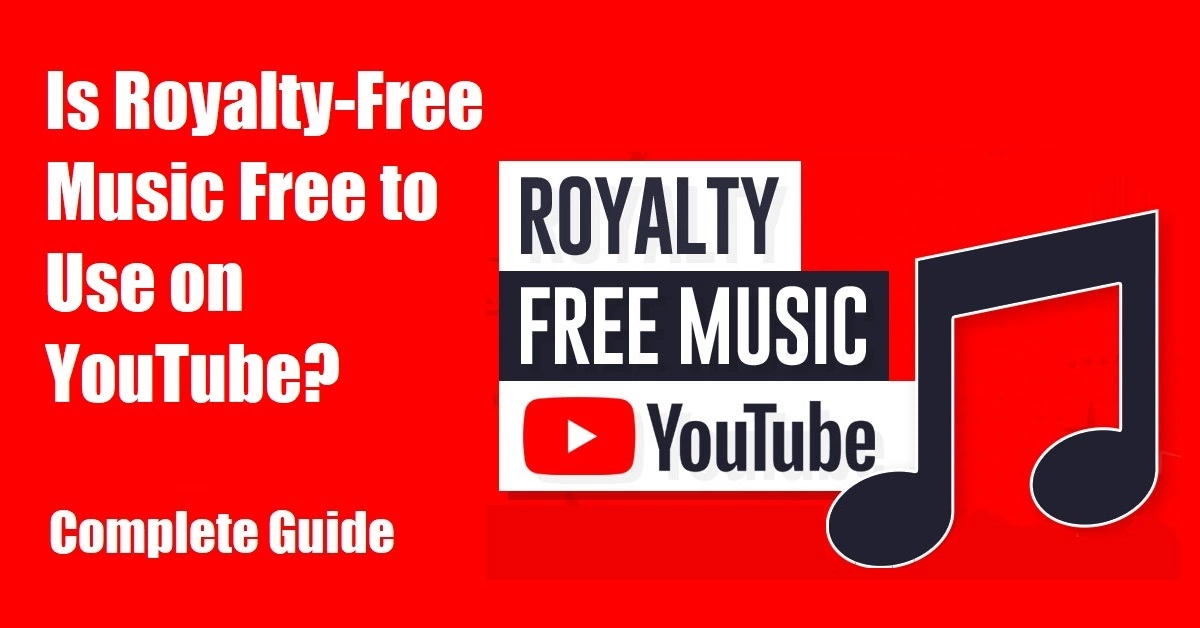Is Royalty-Free Music Free to Use on YouTube? – YouTube nowadays become a most popular platform on earth for content creators to share their unique knowledge, skills and work with a billions of online audience around the world. Many creators also enhance their videos with background music to set the mood or add impact. However, when we talk about usage of music in our YouTube videos, there are so many considerations that you needs to consider before uploading it. In this comprehensive article, we will share the complete details about royalty-free music and discuss whether it is free to use on YouTube or not.

Understanding Royalty-Free Music
Royalty-free music refers to a type of music licensing that allows the user to pay a one-time fee or obtain the music for free in exchange for certain usage rights. It means that once the user has purchased or acquired the music, they can use it in their projects without having to pay additional royalties based on the number of views, plays, or performances.
Licensing and Usage Rights
When you acquire royalty-free music, you typically obtain a license that outlines the terms and conditions of use. The license may specify the duration, territories, and platforms on which you can use the music. It is also crucial to read and understand the licensing terms to ensure compliance with the agreement.
Benefits of Using Royalty-Free Music on YouTube
- Cost-Effective: Royalty-free music offers a cost-effective solution for content creators, as they can acquire high-quality music at a reasonable price or even for free.
- Legal Protection: Using royalty-free music reduces the risk of copyright infringement claims, as you have obtained the necessary rights to use the music in your videos.
- Variety and Flexibility: There is a wide range of royalty-free music available, covering various genres, moods, and themes. This allows content creators to find the perfect track that complements their videos.
- Monetization: Royalty-free music often grants users the right to monetize their videos on platforms like YouTube, allowing them to earn revenue from their content.
How to Find Royalty-Free Music
Finding royalty-free music is now easier than ever, thanks to numerous online platforms dedicated to providing such content. Some popular sources for royalty-free music include:
- Royalty-free music libraries
- Creative Commons databases
- Websites offering free or paid music licenses
- Stock music marketplaces
Attribution and Crediting Requirements
While royalty-free music provides you the full right to use the music without paying any royalties, with a request to provide attribution or credit to the artist or the owner of the music. It is essential to review the licensing terms to understand any attribution requirements and ensure proper crediting where necessary.
Common Misconceptions about Royalty-Free Music
- Royalty-Free Does Not Mean Free: Although the term “royalty-free” might suggest that the music is free of charge, it actually refers to the absence of ongoing royalties. There may still be a one-time fee or licensing cost associated with obtaining the music.
- Exclusivity: Royalty-free music is often non-exclusive, meaning that multiple content creators can use the same music track in their videos. If you wants to have exclusive rights to some specific music, you may need to explore other licensing options.
Legal Implications of Using Copyrighted Music
Using copyrighted music without obtaining the necessary permissions can lead to legal consequences, such as takedown notices, content removal, or even legal action. It is crucial to respect the intellectual property rights of musicians and composers by acquiring legal licenses or using royalty-free music.
Alternatives to Royalty-Free Music
In addition to royalty-free music, there are other alternatives available for YouTube creators, such as:
- Public Domain Music: This type of music is not subject to copyright restrictions and can be used without any restriction and free of cost.
- Creative Commons Music: Creative Commons licenses allow artists to share their work while specifying the conditions of use. Some licenses may require attribution or prohibit commercial use.
- Original Compositions: Creating your own music or collaborating with musicians and composers can provide unique and exclusive music for your videos.
Tips for Using Music in YouTube Videos
- Consider the mood and tone of your video when selecting music.
- Ensure that the music complements and enhances the overall content.
- Adjust the volume levels to balance the music with other audio elements.
- Use seamless transitions between different parts of the video to maintain a smooth flow.
- Test the video on different devices and audio setups to ensure optimal sound quality.
Best Practices for YouTube Content Creators
- Familiarize yourself with YouTube’s policies and guidelines regarding music usage.
- Keep track of the licenses and permissions for the music used in your videos.
- Engage with the YouTube creator community to learn from their experiences and share insights.
- Regularly review and update your video descriptions and credits to include relevant music information.
Conclusion
Royalty-free music provides a valuable resource for YouTube content creators looking to enhance their videos with high-quality music. While it is not free in the sense of having no cost, it offers an affordable and legal solution for incorporating music into your content. By understanding licensing terms, crediting requirements, and exploring alternative options, creators can navigate the world of music usage on YouTube effectively.
Also Read: How to Avoid Copyright Claims on YouTube? The Ultimate Guide
FAQs
1. Can I use royalty-free music in my monetized YouTube videos?
Yes, many royalty-free music licenses allow you to monetize your videos on YouTube and earn revenue from them.
2. Do I always need to provide attribution when using royalty-free music?
Not always. Attribution requirements vary depending on the license. Some licenses may require you to provide proper credit, while others may not.
3. Can I use royalty-free music in commercial projects outside of YouTube?
Yes, you can use royalty-free music in commercial projects as well. By considering the licensing terms, you may be able to use royalty-free music in multiple commercial projects, such as advertisements or films as well.
4. Can I claim copyright ownership over royalty-free music I use?
No, you cannot claim copyright ownership over royalty-free music. The copyright remains with the original creator or the entity that holds the rights.
5. What happens if I use copyrighted music on YouTube without permission?
Using copyrighted music without permission can result in your video being flagged, taken down, or even legal consequences. It’s crucial to respect copyright laws and acquire proper licenses.
In this article, we have explored the concept of royalty-free music and its usage on YouTube. By understanding the benefits, licensing terms, and legal considerations, you can confidently incorporate music into your videos while complying with copyright regulations. Remember to always respect the rights of artists and choose the right music for your content.


Leave a Reply